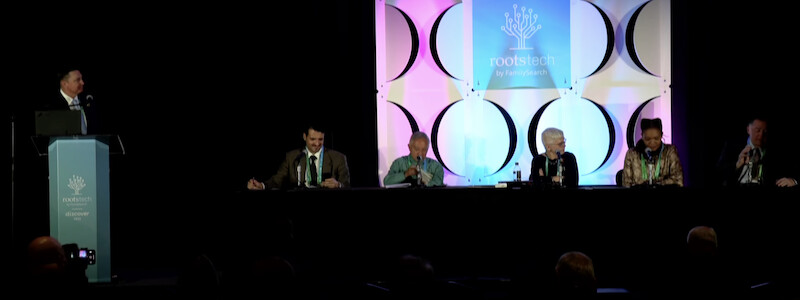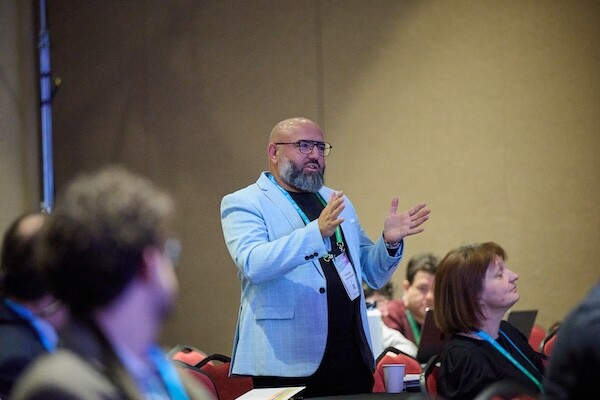Archivists from around the world gathered on Wednesday, 5 March 2025, at the Salt Palace in Salt Lake City, Utah, to share insights and techniques for gathering and maintaining historical records. This Archives and Records Custodians (ARC) Symposium was hosted by FamilySearch International on the day before the 2025 RootsTech conference.
The historical records that archivists preserve represent the collective memories of humanity, providing insights and context for different cultures. These documents make it possible for historians and family researchers to create accurate histories and family trees.
Privacy Versus Access in Archived Records
A panel discussion moderated by Michael Colemere of FamilySearch addressed the challenges of “Navigating Privacy in Archives: Best Practices for Protecting Personal Data.” This panel considered how archivists can balance the sometimes-competing goals of public access and individuals’ privacy rights, while also preserving fragile records.
Expert archivists discussed ethical dilemmas and technological solutions for managing and redacting private data within archival collections. Panelists included Dr. Regalado Trota Jose, chairperson of the National Historical Commission of the Philippines; Thiago Lima Nicodemo, director of the Sao Paulo State Archives of Brazil; Leslie Weir, archivist for Library and Archives Canada; Brenda Mamvura, director of the National Archives of Zimbabwe; and Steve Nickle, senior representative for institutional relations in Asia, the Pacific, and the Philippines for FamilySearch International.

Recognizing the fine line between making records available for research and protecting the privacy rights of the living, the panelists discussed the wide variety of privacy laws internationally, including the laws and regulations that govern their various countries. "The Philippines has some of the stricter privacy laws in the world," said Dr. Jose. "And yet people wish to research their personal family history and data. In most cases, Philippine law requires that people come in person to the archives to access records."
The laws of many countries are complicated. They include federal laws, laws of subdivisions within a country—such as states and provinces—and treaties with indigenous tribes.
The archivists agreed that both goals are important—the need for public access to historical, vital, and genealogical records and the need to protect the rights to privacy of individuals and families.
Steve Nickle shared his experience in acquiring records for FamilySearch, working with archives and government officials throughout the world. "The objective of FamilySearch is to share genealogically important records of the past so people can connect to their families," said Nickle. FamilySearch "is committed to honoring, obeying, and sustaining the laws” of the countries where they gather records. Doing so becomes extremely complicated.
FamilySearch has signed agreements with 170 countries, requiring compliance with the various regulations of each country. As a result, FamilySearch has acquired some records that cannot be shared publicly until a certain amount of time has passed or when approved by the archive. Others may only be shared in the FamilySearch Library itself or through the library system. This is usually because the archive wants to be the public provider of the records or needs to charge for access. Periodic reviews of privacy laws are absolutely essential. "A team of attorneys reviews the laws of the various countries every couple of years," Nickle explained.

Uses of AI in Records Preservation
The rapid advances in artificial intelligence (AI) in recent years have revolutionized document collection and examination. AI applications can help archivists read and transcribe handwritten records, interpret complicated records, find historical information to clarify records, create family trees, and audit and organize records, including by differentiating between private and public use.
Aware of these benefits, the panel was equally aware of the potential problems of AI and the need for human oversight of AI learning models and AI results. Nevertheless, they concluded that AI is valuable for various purposes, when accompanied by proper human oversight. What might take a person hours, weeks, or even years to accomplish, AI can do in minutes or seconds. AI will continue to transform the work of archivists.
Other Symposium Sessions
Wednesday’s symposium included 5 additional learning sessions throughout the day.
Records at Risk
Thomas Mark Nelson, FamilySearch records acquisition manager for Africa, discussed the challenges in preserving important records in “Records at Risk!” Natural and human created hazards may damage or destroy old written records. Digitizing the records for storage in multiple facilities is one way to save the original information.
Rich ancestral histories in Africa and some other areas of the world rely on human memory. When those who know the histories die, the histories die with them. As younger generations leave villages, they may not learn their families’ histories. FamilySearch and other genealogical organizations are hastening to record those memories while those who remember can still share them.

AI Can Improve the Discoverability of Records
“Leveraging Partnerships, Artificial Intelligence (AI), and Community Engagement to Improve Discoverability of Records,” was handled jointly by Jill Reilly of the National Archives and Records Administration (NARA) and Ian James, FamilySearch product manager.
NARA has the most massive collection of valuable historical records in the country, many of which have genealogical value. NARA is collaborating with FamilySearch and similar organizations, using their joint technology to make records more discoverable to the public.
AI is already revolutionizing archival work, they said, dramatically expanding the ability of archivists to interpret and access historical records. NARA and FamilySearch invite volunteers to assist with the project. The two organizations are together sponsoring a volunteer experience in the Get Involved program of FamilySearch.
The Next Wave of AI Breakthroughs
Andrew Gold, research engineer, and Jon Morrey, AI portfolio director, both of FamilySearch, shared “AI Breakthroughs and What They Mean for Archives.” They discussed the ability of AI to do tasks much faster than humans and, in some cases, to do tasks that humans can’t do. They shared ways that AI can be used both by archivists and researchers to find records, with the reminder that AI results must be checked.
Meeting the Needs of Records Custodians
“Meeting the Needs of Records Custodians: FamilySearch Future Direction” was presented by Jim Ericson, Orvill S. Paller, and Dave Wilkes. They shared ways that FamilySearch is trying to meet the needs of records custodians and enabling records access wherever the records are located. They emphasized the need to make copies of records for preservation and public access.
The Impact of Records
Ryan Parker, product manager of the FamilySearch Family Tree, and Valerie Villalobos, website designer, shared the stage for “Heritage Unveiled: The Role of Records in Connecting People to Their Ancestors and Identity.” They discussed the impact around the world of family discoveries in the 130 years since the Genealogical Society of Utah (now named FamilySearch) was founded. As worldwide historical records can be readily accessed, they are transforming lives globally. This in-person session was not broadcasted or recorded.
What Is RootsTech?
RootsTech is a place to learn, be inspired, and make connections through family history. Hosted by FamilySearch and sponsored by other leading genealogy organizations, we have hundreds of expert classes, tips and tricks videos, and inspiring stories that can help you experience family history like never before. Visit our on-demand learning library or make plans to join us for our next virtual or in-person conference event.


